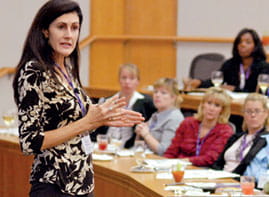Speakers at the Kellogg School’s first-ever Africa Business Conference highlight the fast-changing continent’s challenges and opportunities
2/4/2010 - There are many challenges to doing business in Africa, but Joseph Nyagah thinks the biggest obstacle is the way the rest of the world sees the continent.
“You must change the way you perceive Africa,” Nyagah, the Republic of Kenya’s honorable minister of co-op development and marketing, said Jan. 30 at the Kellogg School’s inaugural Africa Business Conference. “It’s changing politically, economically, socially. It’s not like it used to be. The old Africa is gone. We have problems, but we are trying.”
 |
| More than 250 alumni, students and members of the business community attended the conference, which carried the theme “Emerging Africa: Value Creation in the Next Frontier.” |
| Photo © Dan Dry |
Nyagah addressed conference attendees during a roundtable discussion on good governance and leadership opportunities in Africa. More than 250 alumni, students and members of the business community attended the conference, which carried the theme “Emerging Africa: Value Creation in the Next Frontier.”
| |
 |
Related Video |
|
| |
| |
|
| Despite challenges, many investment opportunities are being created as African countries make political and economic strides, Nyagah said.
“We are beginning to listen to the public in a way our fathers didn’t,” he said. “We have a much more educated population now. With an educated population, that automatically begins to put pressure on the leadership and influence their thinking.”
Fellow roundtable participant Tunde Omotoba ’03, the honorable minister of aviation for the Republic of Nigeria, agreed that Africa has made tremendous gains. Government reforms, stronger institutions, infrastructure improvements and investment in business and agriculture have all helped to create what people are calling Africa’s economic renaissance, he said.
In the aviation sector alone, significant safety and security improvements have been made in Nigeria, Omotoba said. They may still have a long way to go, but landing planes safely has been a huge step forward for the country. Despite these burgeoning signs of prosperity, the worldwide economic downturn threatens the continent’s renaissance, Omotoba warned.
“Despite views that African economies were sufficiently de-linked from the global economy and that contagion would be limited, the impact of the global recession in Africa has served to slow down much of the advances achieved in the last 10 years,” he said. “Nevertheless, the African economy still presents a compelling opportunity.”
Both Nyagah and Omotoba agreed that what Africa needs most is for businesspeople to take advantage of the continent’s burgeoning opportunities.
“There are very good returns to be made in Africa, better than you can get here,” Omotoba said. “You can do new things that you cannot do here. We need more skilled people to help. We want you to give back. That is the only way Africa can thrive.”
One of the best ways to invest in Africa is via entrepreneurial ventures, according to panelists at a discussion on African consumer marketplaces. Benét DeBerry-Spence, founder of the MASAZI Centre social venture in Ghana and a marketing professor at the University of Illinois, said small and micro businesses are important for African economies and offer the easiest entrance into the marketplace.
“They create jobs and have a lot of social implications,” she said. “Big businesses bring big problems and it’s hard to start off with big problems. Start small — use your smarts to grow big.”
DeBerry-Spence’s fellow panelists included Leke Adler, principal of Adler Consulting, which is based in Lagos and London; Gregory P. Kaldahl, vice president, resource planning at United Airlines; and Hugo Malan, SVP and president, fitness and sporting goods at Sears Holdings Corp.
In addition to a private equity and venture capital panel discussion, other conference highlights included a talk by Ecobank Group CEO Arnold Ekpe on expanding in Africa, and another entitled “Africa Rising: How 900 Million Consumers Offer More Than You Think” by author Vijay Mahajan, a professor at the University of Texas.
The common message coming out of all the sessions was that smart businesses will look to Africa in the future.
“There will come a time when Africa will simply be too compelling an opportunity to ignore,” Malan said.






